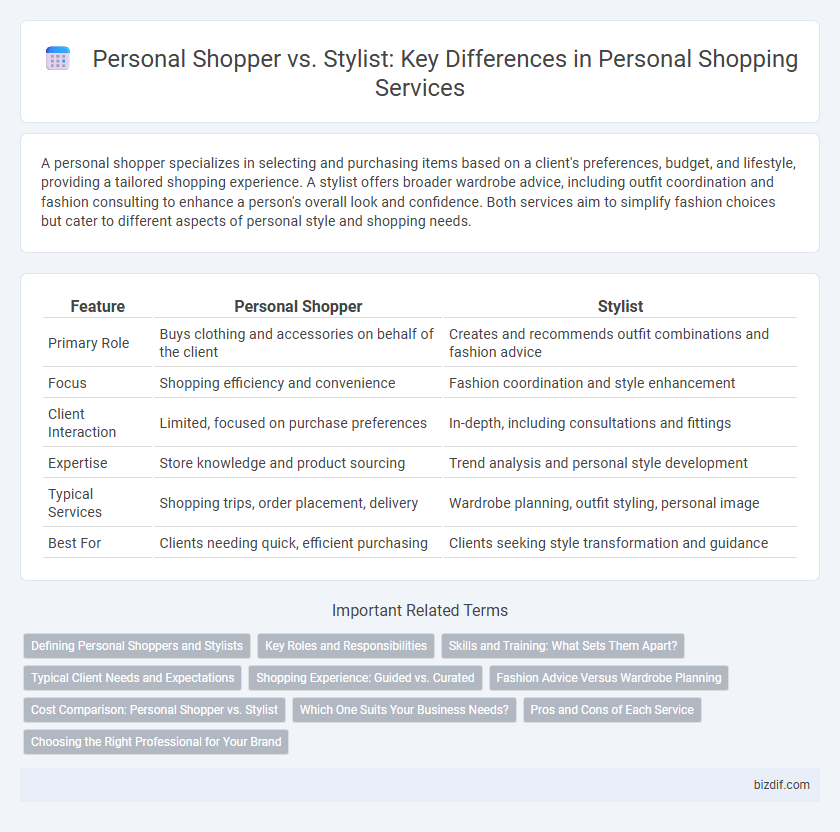A personal shopper specializes in selecting and purchasing items based on a client's preferences, budget, and lifestyle, providing a tailored shopping experience. A stylist offers broader wardrobe advice, including outfit coordination and fashion consulting to enhance a person's overall look and confidence. Both services aim to simplify fashion choices but cater to different aspects of personal style and shopping needs.
Table of Comparison
| Feature | Personal Shopper | Stylist |
|---|---|---|
| Primary Role | Buys clothing and accessories on behalf of the client | Creates and recommends outfit combinations and fashion advice |
| Focus | Shopping efficiency and convenience | Fashion coordination and style enhancement |
| Client Interaction | Limited, focused on purchase preferences | In-depth, including consultations and fittings |
| Expertise | Store knowledge and product sourcing | Trend analysis and personal style development |
| Typical Services | Shopping trips, order placement, delivery | Wardrobe planning, outfit styling, personal image |
| Best For | Clients needing quick, efficient purchasing | Clients seeking style transformation and guidance |
Defining Personal Shoppers and Stylists
Personal shoppers specialize in selecting and purchasing clothing and accessories based on clients' preferences, sizes, and budgets, often focusing on convenience and efficiency. Stylists concentrate on creating cohesive outfits and enhancing individual style by considering body type, wardrobe needs, and current fashion trends. Both roles aim to elevate personal appearance but differ in their approach, with personal shoppers handling the buying process and stylists focusing on outfit curation and style guidance.
Key Roles and Responsibilities
Personal shoppers primarily focus on selecting and purchasing products tailored to the client's preferences and budget, ensuring convenience and saving time. Stylists concentrate on creating cohesive looks by advising on wardrobe choices, outfit coordination, and enhancing the client's overall aesthetic. Both roles require strong fashion knowledge, but personal shoppers emphasize product sourcing while stylists prioritize visual presentation and personal brand development.
Skills and Training: What Sets Them Apart?
Personal shoppers excel in sourcing products tailored to clients' preferences and budgets, relying on strong negotiation skills and market knowledge to find the best deals. Stylists possess specialized training in fashion theory, color coordination, and body shape analysis, allowing them to create cohesive looks that enhance a client's personal brand. While personal shoppers focus on procurement efficiency, stylists prioritize aesthetic harmony through education in design principles and trend forecasting.
Typical Client Needs and Expectations
Personal shoppers primarily cater to clients seeking convenience in acquiring specific items, emphasizing efficient shopping trips and budget management tailored to individual preferences. Stylists address clients desiring comprehensive wardrobe transformation and personalized fashion advice, focusing on creating cohesive looks that enhance personal style and boost confidence. Understanding these distinct needs helps clients choose the right professional to achieve their fashion goals effectively.
Shopping Experience: Guided vs. Curated
Personal shoppers provide a guided shopping experience by assisting clients in selecting items based on preferences and budget, ensuring efficient and personalized choices. Stylists offer a curated shopping experience, focusing on creating complete looks and fashion-forward ensembles tailored to the client's lifestyle. The guided approach emphasizes selection support, while the curated method centers on cohesive style development.
Fashion Advice Versus Wardrobe Planning
Personal shoppers provide targeted fashion advice by selecting outfits and accessories tailored to individual preferences and occasions, enhancing immediate style choices. Stylists focus on comprehensive wardrobe planning, creating cohesive looks by organizing and updating clothing collections for long-term fashion goals. This distinction emphasizes personal shoppers' role in on-the-spot styling versus stylists' expertise in strategic wardrobe management.
Cost Comparison: Personal Shopper vs. Stylist
Personal shoppers typically charge hourly rates ranging from $50 to $150, focusing on budget-friendly solutions and efficient shopping trips, whereas stylists often demand higher fees between $150 and $500 per hour due to specialized fashion expertise and personalized wardrobe curation. The overall cost varies based on service scope, with personal shoppers providing straightforward product selection and stylists offering comprehensive styling, including outfit coordination and trend consulting. Clients seeking affordability may prefer personal shoppers, while those investing in a complete style transformation might find stylists more cost-effective in the long term.
Which One Suits Your Business Needs?
Personal shoppers focus on selecting and purchasing items tailored to clients' preferences and budgets, making them ideal for businesses seeking efficient procurement services. Stylists offer expertise in assembling coherent looks and enhancing personal image, perfectly suited for brands aiming to elevate client appearance and style consultation. Choosing between a personal shopper and stylist depends on whether your business prioritizes streamlined shopping convenience or comprehensive fashion guidance.
Pros and Cons of Each Service
Personal shoppers primarily focus on purchasing items that fit a client's needs and budget, offering convenience and saving time, but they may lack in-depth fashion expertise. Stylists provide personalized fashion advice and outfit coordination, enhancing one's overall look with professional insights, though their services often come at a higher cost. Clients seeking tailored wardrobe enhancement benefit from stylists, while those prioritizing efficient shopping may prefer personal shoppers.
Choosing the Right Professional for Your Brand
Choosing the right professional for your brand depends on whether you need a personal shopper or a stylist. A personal shopper focuses on selecting and purchasing items that fit your brand's needs, streamlining the buying process and saving valuable time. A stylist offers expert advice on how to combine these items to create cohesive, on-brand looks that enhance your brand identity.
Personal shopper vs Stylist Infographic

 bizdif.com
bizdif.com